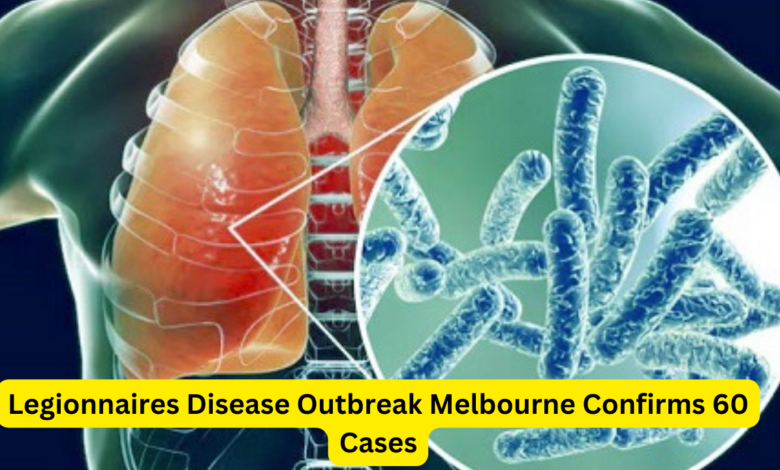Legionnaires Disease Outbreak Melbourne Confirms 60 Cases

Legionnaires disease has recently taken a troubling turn in Melbourne, with a significant outbreak leading to 60 confirmed cases in the state of Victoria. Authorities are on high alert as the numbers continue to rise, sparking concerns among residents and health officials alike.
Understanding Legionnaires’ Disease
Legionnaires’ disease is a severe form of pneumonia caused by the bacteria Legionella. These bacteria are commonly found in natural water sources like rivers and lakes, but they can also thrive in artificial water systems such as air conditioning units, hot tubs, and plumbing systems. When people inhale water droplets or mist containing Legionella, they can become infected with the disease.
The Outbreak in Melbourne
The Victorian Department of Health issued a public alert after noticing a spike in cases across metropolitan Melbourne and surrounding areas. The initial alert was made on Monday, and since then, the situation has only worsened. By Thursday, the department confirmed that there were 60 confirmed and 10 suspected cases of Legionnaires’ disease, predominantly affecting adults over 40 years old.
Symptoms of Legionnaires’ Disease
The symptoms of Legionnaires’ disease typically appear 2 to 10 days after exposure to the bacteria. Early signs include:
- High fever
- Chills
- Muscle aches
- Headaches
As the disease progresses, it can lead to:
- Coughing
- Shortness of breath
- Chest pain
- Gastrointestinal issues such as nausea, vomiting, and diarrhea
Impact on the Community
The outbreak has understandably caused concern among Melbourne residents. Public health officials are working tirelessly to contain the spread and reassure the community. The increase in confirmed cases highlights the importance of vigilant monitoring and maintenance of water systems to prevent such outbreaks in the future.
Long-Term Solutions for Prevention
In the long term, it is crucial for both public and private sectors to invest in improved infrastructure and regular maintenance schedules for water systems. This includes implementing advanced filtration and disinfection technologies to reduce the risk of Legionella contamination. Educating the public and facility managers about the importance of proper water system management can also play a significant role in preventing future outbreaks.
Healthcare System Preparedness
The healthcare system must be prepared to handle an increase in Legionnaires’ disease cases, especially during an outbreak. This involves training healthcare professionals to recognize the symptoms early and providing them with the necessary tools and resources for prompt diagnosis and treatment. Hospitals and clinics should have protocols in place for managing outbreaks and preventing further spread within healthcare facilities.
Risk Factors for Legionnaires’ Disease
Certain groups of people are more susceptible to Legionnaires’ disease, including:
- Individuals over 50 years old
- Smokers
- People with chronic lung diseases
- Individuals with weakened immune systems
Preventing Legionnaires’ Disease
Preventing Legionnaires’ disease involves maintaining and regularly cleaning water systems where the bacteria can thrive. Here are some key preventive measures:
- Regularly disinfecting water systems like cooling towers, hot tubs, and decorative fountains.
- Ensuring proper water temperatures in hot water tanks and heaters to minimize bacterial growth.
- Using chemical treatments to kill bacteria in water systems.
- Regular maintenance and cleaning of air conditioning units and other systems that use water.
Health Authorities’ Response
The Victorian Department of Health has ramped up efforts to control the outbreak. They are conducting extensive testing and inspections of water systems in public and private buildings across Melbourne. The health department is also working closely with local hospitals and clinics to identify new cases quickly and provide prompt treatment.
Public Awareness and Safety Measures
Authorities are urging the public to be vigilant and aware of the symptoms of Legionnaires’ disease. They recommend the following precautions:
- Avoiding places where Legionella bacteria are likely to be present, especially for high-risk individuals.
- Ensuring good hygiene and regular cleaning of home water systems, such as showers and hot tubs.
- Seeking medical attention if symptoms develop, especially for those who have been in areas where the outbreak has occurred.
Impact on the Community
The outbreak has understandably caused concern among Melbourne residents. Public health officials are working tirelessly to contain the spread and reassure the community. The increase in confirmed cases highlights the importance of vigilant monitoring and maintenance of water systems to prevent such outbreaks in the future.
Conclusion
The surge in Legionnaires’ disease cases in Melbourne serves as a stark reminder of the dangers posed by Legionella bacteria. As authorities continue to investigate and mitigate the outbreak, the public must remain informed and take necessary precautions. Maintaining clean water systems and being aware of the symptoms can help prevent further cases and protect public health.




